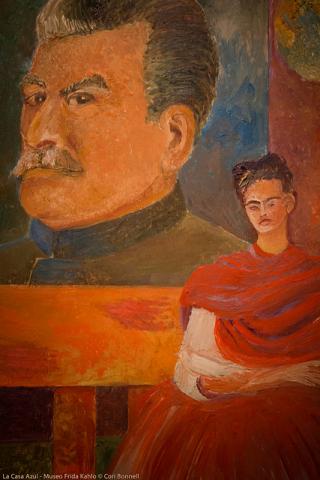Art Vs. The Artist
Nov 20,2015
Social justice fixatives rejoiced this month for what they perceived as a major victory in the Global War On Oppression: after years of bestowing a trophy made in the likeness of weird fiction pioneer and creator of the influential Cthulhu mythos H.P. Lovecraft to worthy fiction writers, the World Fantasy Awards announced that it would no longer use the trophy. This decision was fueled in large part by an online petition calling upon the group to retire the bust, denouncing the writer for his "hideous opinions," and calling for a new trophy that didn't only appeal to what some of it's proponents obnoxiously referred to as "white Christian men" (a description that is as ironic as it is ignorant, given Lovecraft's well-documented contempt for both religion and immigrants from Southern and Eastern Europe).
You see, Lovecraft was, as the signers of the petition made sure to point out, an "avowed racist," and thus axiomatically, his engraven image must cause untold amounts of psychic distress to people of color (which color, you ask? I'm not quite sure. Given their disdain for Lovecraft and his "terrible" prose, we can probably rule out The Color Out Of Space). But it's all good now, because the bust of the bigoted sci-fi writer who died penniless and cancer-ridden almost a century ago is gone for good, no longer able to impose it's hateful gaze on unsuspecting prize-winning authors. Free at last, free at last, thank Cthulhu almighty, we're free at last!
Fortunately for Providence's favorite son, not everybody felt like the retirement of the bust was some giant leap for mankind (oh, I mean humankind. Pardon my male privilege.) None other than S.T. Joshi, the preeminent Lovecraft scholar of our time and by remarkable coincidence, one of those pee-oh-cee's the social justice crowd is always going on about (an Indian to be precise, unlike the SJWs are when discussing their "POC's"), has risen to Lovecraft's defense. A recipient of the award on two occasions himself, Joshi felt he had no choice but to return both of his trophies to the WFA, finding their submission to the petition's demands craven and indefensible. Additionally, after considering the expansive litany of objectionable content and views expressed by many famous writers, he finds their myopic obsession with Lovecraft's racism incomprehensible. "The next goal of our moral crusaders must surely be the Bram Stoker Awards. Stoker’s Dracula, it is quite evident, is a vile anti-immigrant tract: here is a story about a 'monster' from Eastern Europe who has come to England to drain the life-blood out of noble Anglo-Saxons!" he ingeniously jests.
As if that weren't offensive enough, Stoker actually wrote a disgusting novel, The Lair of the White Worm, in which he repeatedly referred to black characters as the n-word, barbarians, savages, and other appalling slurs! And people still read this man's books, give out awards named after him, and dress up as his most famous creation on Halloween?! Unacceptable! And let's not even get started on that Mark Twain fellow, a so-called "humorist" who apparently thought the n-word was so funny that he used it dozens of times in his book, the deceptively-innocent-sounding Adventures of Huckleberry Finn, causing it to be banned from entire school districts! In spite of that, this blatant hatemonger is not only revered as an American icon,but has two awards named after him: one for comedy and, even more sickeningly, one for children's literature! And people say that racism is a thing of the past!
Now of course, one might say that these aren't fair comparisons. While Twain, as has been noted countless times, used bigotry in his work to satirize it, Lovecraft and Stoker invoked it not because they were mocking it but because they deeply subscribed to it. So while Adventures of Huckleberry Finn does contain racism, it doesn't affirm it the way that The Lair of the White Worm and, say, Lovecraft's On The Creation of N*****s do. Fair enough: readers are certainly within their rights to regard the racism of authors like Lovecraft and Stoker as significant personal failings and take it into account when evaluating those stories of theirs that contain elements of it. But does that mean we should dismiss their entire literary output because of this single shortcoming of theirs, as injurious as it is? Should we stop celebrating them lest writers are inspired to think like them as they are to write like them? Should we forget The Call of Cthulhu because of On The Creation, Dracula because of The Lair of the White Worm?
Before we answer these questions, let's return to Joshi's keen observation about our culture's monomaniacal obsession with Lovecraft's racism. Again, why does it seem that, with all the horrific beliefs and positions held by any number of our literary and artistic giants, people only really have a beef with the ones held by Lovecraft? Why, for instance, do we begrudge Lovecraft his support for Jim Crow but not Frida Kahlo's support for Joseph Stalin, a vicious tyrant whose body count was exceeded only by China's Mao Zedong (another hero of Frida's), who a plurality of historians believe to be history's worst mass murderer? Frida's enthusiasm for communist tyrants weren't just, as many of her fans maintain, a minor eccentricity or idiosyncrasy of hers: her devotion to Stalin and the totalitarian ideology he represented is visible in her later art, with her even painting a self-portrait of herself flanked by a portrait of the Soviet dictator and bemoaning her older, personal work, writing in her diary, "I feel uneasy about my painting. Above all I want to transform it into something useful for the Communist revolutionary movement... I have to fight with all my strength to contribute the few positive things my health allows me to the revolution. The only true reason to live for." This at a time when the crimes of Stalin had become common knowledge and the groundwork was being laid for those of Mao.
But why stop at Frida? Why not revive the blacklisting of the McCarthy era and disavow Dalton Trumbo, a Stalinist-sympathizing screenwriter who was recently eulogized in a Bryan Cranston film? How about we expel Allen Ginsberg's "Howl" from the classroom because he defended and briefly joined the reprehensible North American Man-Boy Love Association, more notoriously known as NAMBLA? And while we're at it, we can get rid of all our Cat Stevens (known as Yusuf Islam these days) records because he passive-aggressively called for the death of Salman Rushdie on account of his writing The Satanic Verses! If we're serious about purging our arts of people with "hideous opinions" as the anti-Lovecraft petitioners say they are, we're going to have to cast a much wider net than the narrow one they have. You ask if there will be any artist who is pure enough to not be outcast from the realm of respectable opinion? Please, don't make me laugh. Protecting people's feelings from odious views is far too important a goal to waste our time with such backward notions as freedom of expression.
Or maybe, just maybe, we don't have to protect ourselves. Maybe, all we need to do when faced with a creative work that espouses a philosophy or ideology inimical to our own is stand firm and resist it. If it truly is ill-founded and without merit, then there is no chance that you will fall prey to it. Having established that, one can now proceed to judge the work as a whole. Does the rest of the piece outweigh the author's dubious prejudices, or is it too heavily weighed down by them for the work to achieve anything? I guarantee that most of the time, the answer will be yes, for the simple reason that it is impossible to agree with anyone, much less someone who wrote just under a hundred years ago, completely. Part of what makes literature, art, and music the wellsprings of creativity that they are is the fact that they are marketplaces of ideas, where even bad ideas get their moment in the limelight. You are not obliged to agree with everything any one participant in this marketplace says, but if you listen to what else they have to say, you might find that they have something truly incredible to offer.
That's what it means to be a fan. It means bearing with an artist's unpalatable and uncomfortable works and opinions because of their powerful and inspiring ones. It means tolerating perspectives different and occasionally outright hostile to your own. It means forgiving Lovecraft for On The Creation because of The Call of Cthulhu and forgiving Frida for Self-Portrait With Stalin because of The Two Fridas. It means understanding that imperfect people can make perfect things.
Photo: flickr






